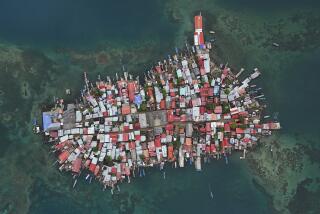Eco-Tourism a Washout in Brazilian Wetlands
- Share via
CORUMBA, Brazil — They come from as far away as Germany and Japan, eager to marvel at the alligators and to fish for rainbow trout in the tea-hued waters, to stand under skies busy with white storks and red-and-blue macaws.
But the tourists don’t come in the needed numbers. If ever a place seemed made for eco-tourism, it is Brazil’s Pantanal -- the world’s biggest expanse of wetlands. For years, people bet on the region’s potential for economic development based on conservation.
Not anymore. Tourism has failed to bring the hoped-for prosperity, and support is growing for old-fashioned industrial development -- even if that means perhaps irreversible damage to the ecosystem.
“Here in Corumba, we get by on miracles,” said Maria Daise Mendes Vernoque, 53, who runs fishing tours from the region’s biggest city. “We know these kinds of projects will pollute our beloved Pantanal, but every progress has its sacrifices.”
Environmentalists say there still is room to develop eco-tourism. They argue that businesses in the Pantanal have concentrated too much on simple fishing tours that have depleted the region’s once-rich fish stocks.
But signs of economic hard times abound in Corumba, a city of 90,000 people 1,000 miles northwest of Rio de Janeiro. Streets are filled with idle young men claiming to be Pantanal guides, hustling everything from tours to cheap Bolivian cocaine to sex with young girls.
With ranching and farming limited by the Pantanal’s poor soil and seasonal flooding, conservation now seems to many people a luxury that the region can no longer afford.
The governor of Mato Grosso do Sul state, Jose Osorio dos Santos, says the solution lies in the 2,000-mile pipeline that runs through the state carrying natural gas from Bolivia to Brazil’s industrial capital of Sao Paulo.
Santos wants to build a thermoelectric plant, a steel mill and a petrochemical complex to be fueled by the gas and turn this sleepy colonial city into a hub of industry.
“It only makes sense to take advantage of the state’s privileged position,” Santos said. “Today, we import 85% of the energy we consume, but if we take advantage of the pipeline we will have self-sufficiency, which is fundamental for development.”
Santos dismisses concerns that such development would endanger the Pantanal’s delicate ecological balance.
“This is blah-blah-blah that you can’t have a thermoelectric plant because it will pollute and do away with the Pantanal,” he said. “There won’t be a negative impact if we know how to work.”
Environmentalists disagree. They fear an expanding industrial economy could not help but harm the 56,000-square-mile flood plain, which sprawls over parts of two Brazilian states and into Bolivia.
“What worries us in relation to the thermoelectric plant is what it will generate in the future with the installation of other industries,” said Reinaldo Lourival, director of Conservation International’s Pantanal program. “Obviously, the fallout from these industries will end up in the Pantanal.”
This could be disastrous for the Pantanal, home to some 650 bird species, 230 fish species, 80 mammal species and more than 1,000 kinds of butterflies.
Because the Pantanal is essentially an enormous settling pond with virtually no flushing mechanism, industrial pollutants could quickly build up, poisoning the more fragile species and provoking a catastrophic domino effect running up the food chain.
Still, Lourival says some industrial development is inevitable. Rather than try to block industry altogether, he is pressuring the government to enact and enforce strict environmental regulations.
That strategy has worked before. Tough rules resulted in a minimal impact on the environment by the natural gas pipeline, Lourival said.
Pressure from environmentalists also helped stall a multibillion-dollar plan to deepen and straighten the Paraguay River, which runs through the Pantanal, to create a river link from the Atlantic Ocean to the heart of South America.
The U.S.-based energy company El Paso Corp. has already backed out of a proposal to build a thermoelectric plant in Corumba, citing the stringent environmental regulations.
Still, some environmentalists fear regulations won’t be enough if the state builds thermoelectric plants and a steel mill.
“It’s not just the pollution. These projects will bring more and more people into a region with a very precarious infrastructure,” said Alcides Faria, director of the local environmental group Ecology in Action.
Some warn that the promise of industrial development could be just as illusory as eco-tourism.
“Because of the economic stagnation here, any type of project generates a lot of expectation, but too often there is no plan behind it,” said Shabib Hany of the Corumba-based Organization for Citizenship, Culture and Environment. “That was the case with eco-tourism, and that’s the case with the thermoelectric plant.”
More to Read
Sign up for The Wild
We’ll help you find the best places to hike, bike and run, as well as the perfect silent spots for meditation and yoga.
You may occasionally receive promotional content from the Los Angeles Times.






